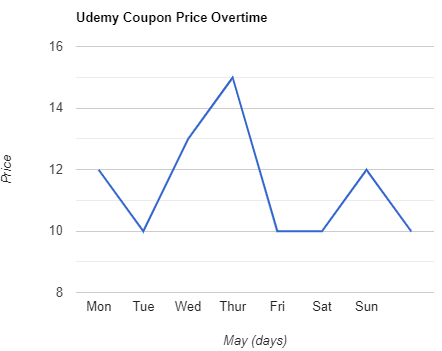Depression, Social Anxiety - understanding and recovery (Udemy.com)
Treat Depression, Beat Anxiety With Theatre : Treat Anxiety and Depression : Lift Depression & Beat Anxiety With Cinema
Created by: Chris Bankes Sivewright
Produced in 2022
 What you will learn
What you will learn
- Understand what depression is and how to prevent it in the future.
- Understand and apply the Linden Method
- Understand how improvisation can be a complement to therapy for depression and anxiety
- Cry! Understand why some films make us cry - and that may be good for us!
- Understand how acting puts a strain on performers
- Appreciate how films and location my affect your mood
- Understand more about crowdfunding for a film, see the trailer and then the final film
- Understand the thoughts behind the film via an interview with the producer
- Greater emotional resilience!
- Understand about nutrition and depression what to eat, what to avoid
- Augment your happiness!
- Select the RIGHT type of EXERCISE to reduce depression!
- Understand about thoughts, mental health and emotional wellbeing
- Understand how CBT may be used to treat yourself for depression phobias and how to treat anxiety disorders
 Quality Score
Quality Score
Overall Score : 94 / 100
 Live Chat with CourseDuck's Co-Founder for Help
Live Chat with CourseDuck's Co-Founder for Help
 Course Description
Course Description
"GPs prescribing arts activities to some patients could lead to a dramatic fall in hospital admissions and save the NHS money, according to a report into the subject of arts, health and wellbeing published after two years of evidence gathering.
The report, published on Wednesday, includes hundreds of interviews and dozens of case studies showing how powerfully the arts can promote health and wellbeing."
- The Guardian newspaper 17 July 2017
This course about how theatre/cinema can be used to reduce depression and anxiety, was originally divided into ten lectures but we expanded it a little as a crowd funding campaign caught our eye and so we have an extra lecture about the campaign, an interview with the producer and some useful websites.
PLUS NUMEROUS EXTENSION ACTIVITIES (see below!)
The total lecture time is about two hours - think how much can be learnt in that time!
BUT this is not a course just about watching and listening. It is about learning and putting into action.
Maybe you know someone who is depressed.
Maybe YOU are suffering from depression and anxiety!
This course is about helping, helping you and enabling you to help others as well as yourself!.
Comments and questions are always welcome - and they are usually responded to within 24 hours.
Lecture 1 distinguishes between stress, depression and anxiety. The lecture concludes with the symptoms of depression.
Lecture 2 deals with the influence of the arts in particular theatre and shows how theatre involvement can reduce depression.
Lecture 3 outlines current government policy (and the policy of the Official Opposition) on the Arts.
Lectures 4 and 5 return to theatre and how involvement in theatre can reduce depression.
Lecture 5 in particular shows how acting may be therapy.
Lectures 6 and 7 show how improvisation in particular may be therapeutic for those suffering from depression.
Lecture 8 is a spoof video on drama therapy. It is made up of outtakes from a film about a family playing monopoly. All the links in the film are genuine and it has a serious message to put across.
Lecture 9 deals with the differences between theatre and cinema.
Lecture 10 explains how cinema portrays - and can be used to reduce - depression. Various films are suggested.
Lectures 11 and 12 describe the crowd funding campaign for a film produced by a 17 year old male who himself has suffered from depression.
Lecture 12 is an interview with the young producer.
Lecture 13 shows the results received when the question Which is the best movie to watch when you are depressed?' was asked.
The closing lecture, lecture 14, talks the viewer through two websites that provide further resources to investigate when dealing with depression.
EXTENSION TOPICS INCLUDE:
- Augmented happiness
- Breaking the cycle of depression and anxiety
- Building emotional resilience - create an armoury!
- Cognitive Behavioral therapy (CBT)
- Coping with anxiety
- Depression and gender differences
- Emotional well-being
- Food to welcome
- Foods to avoid
- Improvisation and therapy
- Investment in the Arts
- Mental health policy
- Solution focused brief therapy
- Supplements to take
- Ten calming mantras
- The right exercises for depression - the right ones for you!
- Theatre and emotional health
- Treating yourself for phobias, anxiety disorders, depression
- World Mental Health Day
The overall purpose of this course is to provide ways in which depression and anxiety may be reduced but also to raise awareness.
"Depression is a common illness worldwide, with more than 300 million people affected. Depression is different from usual mood fluctuations and short-lived emotional responses to challenges in everyday life. Especially when long-lasting and with moderate or severe intensity, depression may become a serious health condition. It can cause the affected person to suffer greatly and function poorly at work, at school and in the family. At its worst, depression can lead to suicide. Close to 800 000 people die due to suicide every year. Suicide is the second leading cause of death in 15-29-year-olds "
- The World Health Organisation
This course should be seen as just a few steps to try and reduce the problem, the sadness and the despair.
#anxiety #depression #depressionandanxiety #anxietyanddepression
New workbook added July 2019 on Decluttering
Chapter 1: Decluttering and mental health
Chapter 2: 5 Scientific Reasons Decluttering Your Home Will Make You Happier
Chapter 3: Tips to declutter when depression has made you neglect your apartment
Chapter 4: Remove Clutter to Reduce Stress (+ 5-Step Decluttering System)
Chapter 5: The psychology behind organizing and decluttering.(Marie Kondo)
Chapter 6: 6 Reasons Why Decluttering Is Good for Your Health
Chapter 7: 9 Ways Your Life Will Improve When You Declutter
Chapter 8: Here's Why Decluttering is Good For You and How to Get Started
Chapter 9: 12 Ways a Deep Declutter Can Improve Your LifeWho this course is for:
- EMPLOYERS: You may be in a position to help reduce depression in the workplace
- EMPLOYEES: This course is for people of all occupations prone to depression and anxiety.
- THOSE UNEMPLOYED: Perhaps unwillingly, you have more time - but perhaps also, more risk
- SELF-EMPLOYED: Working alone can mean the risk of depression multiplies
- STUDENTS: The stress of exams - an outlet is needed
- PARENTS: You have your own stresses - you too need an escape
- ACTORS: Acting creates its own pressures - sometimes you need to take a step back
- TEENS: Perhaps more at risk than anyone - know there are ways you can help - and be helped
- ANYONE AND EVERYONE: Fresh ideas, resources and awareness that there are others out there
 Instructor Details
Instructor Details

- 4.7 Rating
 17 Reviews
17 Reviews
Chris Bankes Sivewright
Studied at:
University of Oxford (Philosophy and Economics)
Oxford Brookes (Teacher training)
University of Glamorgan (Business and Economics)
Qualifications
Professional qualifications at Masters level
Business and Economics degree
Examiner for four major examining boards, at O' and A' level.
Three teaching diplomas plus CELTA
Qualified fitness trainer
Key academic positions held:
Principal Oxford School of Learning
Director of Studies: St Joseph's Hall, Oxford
Head of Economics: Cherwell
Head of Business and Economics: Pipers Corner School, Buckingham
Founder: Almost Random Theatre
Business and Economics background
Set up and ran Oxford Conferences and ran 50+ Business/Economics conferences at schools - all fees to charity
Amazon Business/Economics books include:
Titles include:
Case studies for Business
Time management for teachers
Creativity techniques in Economics
Drucker in Business Studies
Creativity in Business
Business calculations
Further applications of de Bono
Applying de Bono
Philosophy Games
Taught students at the University of Oxford , Brookes University and schools in the state and independent sector
Principal of Oxford School of







